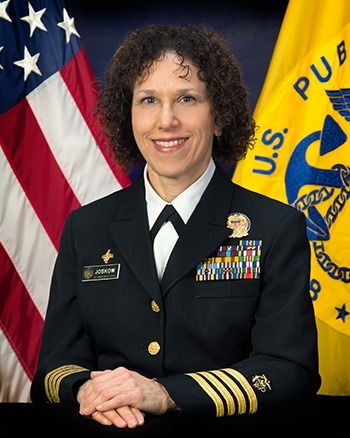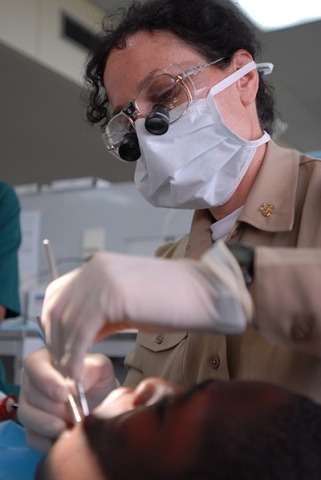NIDCR’s Director of Communication, Jeff Ventura, sat down with Renée Joskow, DDS, MPH, who recently joined the institute. She shared elements of her professional journey and discussed her new role as Senior Advisor to NIDCR’s Director, Dr. Rena D’Souza.
Jeff: Tell us about your professional background.
Renée : I attended Columbia University, where I completed a dual degree program and received both my Doctor of Dental Surgery and Master of Public Health degrees.
Jeff: And from there?
Renée : I completed a hospital-based General Practice Residency and then returned to Columbia as an Assistant Professor, teaching both in preclinical and clinical courses with one-half day a week reserved for research. I also served as the course director of the Dental Anatomy and Occlusion course for 1st year students and the 4th year student clinical elective in advanced general practice.
During my tenure at Columbia, things really started to come into focus regarding my goals of combining teaching, clinical practice, and research. For more than 10 years, I served as the faculty advisor for the William Jarvie Student Research Society and Chair of the Birnberg Research Award selection committee. I always reflect upon how fortunate I was to have Dr. Irwin D. Mandel, one of the great researchers in the field of dentistry, as my student research advisor and mentor.
While I was teaching at Columbia, I started a private practice in New York City, and was inspired by Dr. Mandel’s research at Columbia’s Clinical Research Center (funded by NIDCR) and had a dream: of someday going to NIH/NIDCR. Lo and behold, I saw a listing in the Journal of the American Dental Association for an Intramural Research Fellowship at NIDCR, led by Dr. Dushanka Kleinman, who I had met when I was a dental student. Without hesitation I applied for the NIDCR Dental Public Health Residency and Fellowship.
Jeff: It sounds like a “the rest is history” moment for you.
Renée : Yes, it really was. When I found out I was accepted, I was thrilled and at the same time sad about leaving teaching and my private practice, but packed up everything and headed to NIH in Bethesda, MD. Dr. Kleinman became my supervisor and mentor, along with Dr. Rob Selwitz. Shortly after I started at NIDCR, I was honored to be accepted into the highly competitive Epidemic Intelligence Service, or EIS—aka the “disease detectives” at the Centers for Disease Control and Prevention (CDC).
So, I finished my NIDCR residency and fellowship and moved down to the CDC in Atlanta as an EIS officer assigned to the National Center for Environmental Health, focusing on emerging environmental threats. This was also my initial assignment as an officer in the U.S. Public Health Service (PHS) Commissioned Corps. It was an incredibly exciting experience because I worked on outbreak investigations, both internationally and across the U.S. During my tenure at CDC, I led disease and injury surveillance efforts and infectious and environmental exposure investigations. After completing two years as an EIS officer, I accepted a position with the Office of the Surgeon General (OSG) in Washington, DC.
Jeff: You’ve had an incredible professional journey.
Renée: It's been amazing. My position at the OSG was Medical Readiness Manager and Director of Training and Education for the U.S. Public Health Service Commissioned Corps—including developing and providing training for 6,100 fellow officers across multiple professional disciplines. We were also the deployment arm for the OSG and worked many long but rewarding hours responding to natural and man-made disasters as well as National Security Special Events. We were a small but mighty team who are bonded for life—what an incredible experience.
I then transferred to an assignment in the Department of Homeland Security, Science and Technology Directorate, as the senior medical epidemiologist, working in the Chem and Bio early detection program. This was both challenging and rewarding, working with state and local jurisdictions, scientists at national laboratories, academic institutions, and the CDC at the juncture between public health and emerging science and technology designed to protect the nation.
Still, I kept feeling a tug to go back to NIH, and then got an opportunity that I could not refuse. I accepted a position in what was then called NCRR, the National Center for Research Resources, which later became NCATS, the National Center for Advancing Translational Science. I worked in the Clinical Translational Science Award (CTSA) program for many years as a program official and dental officer (research).
I established a national dental network across the CTSA program and am still in touch with several of those colleagues today. Actually, that was how I met Dr. D'Souza, the current director of NIDCR. I thoroughly enjoyed working at NCRR and NCATS and had the opportunity to work on CTSA operations, workflow and process improvement initiatives, and across the entire continuum of translational science, research, and training—including the development of a set of translational competencies for the next generation of researchers.
As a PHS officer we are encouraged to change assignments periodically to expand the breadth of our experience and expertise, so when I heard about the opening for the Chief Dental Officer at the Health Resources and Services Administration (HRSA), as much as I hated to leave NIH, I felt it would be another great adventure. Everybody told me the HRSA Chief Dental Officer position was a wonderful opportunity and that I would be able to have an impact at a population level; on the health of the public and those who are underserved or medically vulnerable. So, for almost 10 years I've been leading HRSA’s oral health initiatives and collaborating with new stakeholders and colleagues. However, I am so excited and thrilled to be back at NIDCR.
Jeff: You said NIDCR was “tugging at your heartstrings.” What is it that does that in terms of your professional career? What is it that makes you most passionate?
Renée: Well, I think it's a homecoming for me. My very first experience in research, when I was a dental student with Dr. Mandel, taught me the importance of scientific rigor. And because I was in a dual degree program, I was not only learning clinical dentistry, but simultaneously learning about the influence of community and population health, too. In other words, I was seeing in real time how you can have an impact at not only the individual but also at a population or community level. And so, the idea of implementing well designed and significant research that propels us forward and makes a difference in people's lives, at both an individual and at a population level, is something that I feel is important and powerful.
Jeff: What do you see now as major challenges in oral health? What are the problems you’re eager to solve?
Renée : Throughout my professional career and through personal experience, I often hear that people don't understand why having good oral health matters; some health professionals as well as the public don't fully appreciate the relationship between the mouth and the rest of the body—that oral health is essential to overall health and function and it plays an important role in many aspects of our lives.
We have an opportunity to communicate and bring together a “whole health” view and engage the public and the health systems around the topic. I've spent the last two years working on an oral health literacy campaign and engaging directly with the public and health professionals. With the upcoming release of the NIDCR report, Oral Health in America: Advances and Challenges, NIDCR has an opportunity to accelerate the translation of currently available data and science into practice, policies, and behaviors to improve the health of the public at an individual, family, community, national, and global level.
Jeff: What do you think people would find surprising about your career?
Renée: Well, I think people are always amazed about the breadth and scope of my career path—that you don't have to be just a clinical dentist. I hear that all the time. I have taken a truly non-traditional path—combining clinical practice, research, academia, medical epidemiology, and that has changed how I see the world. I've worked in international settings doing not only clinical dentistry, but public health, engaging with Ambassadors and Ministers of Health, and with people living in the most austere environments, who don't have running water, and yet they're excited to learn about ways to improve public health.
I also believe that those who train as clinical dentists may not think beyond the clinical techniques we are taught in dental school and recognize the broad and solid foundation that our education confers. I’ve benefited from the integrated, multidisciplinary approach I was taught in dental school and experienced in my hospital residency—integrating systems of care and addressing the whole person across medicine and dentistry, appreciating the psychosocial basis of medical and dental practice, and environmental factors to help prevent disease and promote health.
Jeff: What are your thoughts on the role of dentists in the pandemic?
Renée: Well, I feel fortunate that I have been able to rely on my many years of experience as a field medical epidemiologist and a dentist. I feel well prepared.
The pandemic underscored the need for frontline public health and our dental professional training prepared us to respond to a pandemic. We are trained in physiology and infectious diseases and we understand from our basic science and clinical science training about transmissibility. I think dental professionals are well poised to be frontline responders, vaccinators, and disseminators of reliable information. Dentists are often trusted spokespersons in communities and as such we need to also be vocal science and public health messengers.
Jeff: What do you do for fun?
Renée: Well, I engage in community service and am very passionate about nature, the outdoors, and music, and have been my whole life. A little fun fact: I sang with the Juilliard Choir for about three years, while in New York, and I have wonderful memories from performing at Lincoln Center’s Alice Tully Hall.
I'm also an amateur potter. Not surprisingly, I like working with my hands and I love creating things- so pottery is lots of fun. I also enjoy baking.
Jeff: Where is family? Where are you originally from?
Renée: I have a close-knit family who live across several different states. I spent my early years in the Bronx (New York City) and then moved north and enjoyed hiking in the nearby mountains.



